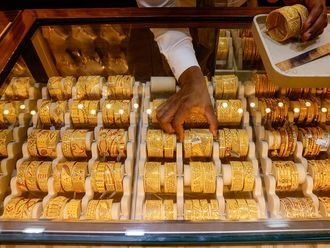
Dubai
Equities as an asset class has been the best performer since 2003, followed by investments in property and government bonds, according to a study.
An investment of 100 pounds (Dh477) in equities, as measured by MSCI World Total Return index would be worth 306 pounds, or an 8 per cent return. A similar amount invested in property would be worth 275 pounds, a study conducted by Schroders of asset classes since 2003 revealed.
Investments in commodities would have given you the worst returns in the last 14 years. An investment of 100 pounds would have given a negative return. The commodities investment would now have been worth 94.41 pounds.
They are the only one of six assets, which includes cash, shares, government bonds, property and company bonds, that would have lost investors’ money had they been invested since 2003, according to Schroders.
Need to diversify
According to fund managers, the varying quantum of returns from various asset class or even negative returns from commodities underlines the need for diversification.
Marcus Brookes, Head of Multi-Manager at Schroders, suggests achieving diversification by choosing assets with low correlation to each other.
“This means holding assets with the potential for strong returns that have very little economic relationship to each other. For instance, this could mean holding US property and Japanese equities,” Brookes said.
Brookes has diversified his portfolios by backing gold, and even cash, given that bonds and equities, in some regions, look expensive.
“The aim should not be to invest in an asset with a poor potential return in order to diversify the risk from an asset with a good potential return. That is known as ‘diworsification’ — risk may be reduced, but so are returns,” he added.
Good returns
In the current market environment covered with political and economic uncertainty, Franklin Templeton expects reasonably good returns in equities as the bond market falters.
“There has been too much money going into bonds, and a lot of investors are very worried about equities because of the macro issues like whether the euro will fall apart, or will growth ever come back to developed market, whether inflation will return,” Sukumar Rajah, Managing Director and Chief Investment Officer — Asian Equity, Local Asset Management, Franklin Templeton Investments told Gulf News over the phone from Singapore.
“Many of those worries are being addressed. Employment levels are up, growth is improving, fears of disintegration are being addressed. So there is a reason for investors to shift from bonds to equities. I think equity flows will continue to be better in the next 10 years, from the period from financial crisis,” Rajah added.
Fund managers will have to be stock specific in case of US markets, which has been a record breaking rally, and the emerging markets which were badly hit during the downturn are now stabilising.
“The quality of companies are in favourable portion of markets. There are much more companies. There has been a concerted effort to improve corporate governance standards in Korea. These specific factors are improving and that should have a positive impact structurally,” Rajah said.
Franklin Templeton expects rotation in equity markets from a very short term point of view.
Investors may be interested in China, where a new breed of companies relating to the service sector are flourishing. Companies in South East Asia may also be of interest to investors due to the rising power of the middle class.
People have under-invested in equities and that money is slowly coming into the market, Rajah added.
Box:
What are the benefits of diversification?
Reducing risk: A crucial imperative for most investors is not to lose money. This is always a risk with investing, but diversifying may mitigate that risk.
Retaining access to the money you need: In times of stress the ease with which you can buy and sell an asset is critical to the survival of your investments.
Smoothing the ups and downs: The frequency and extremity with which your investments rise and fall determines your portfolio’s volatility. Diversifying your investments can give a greater chance of smoothing out those peaks and troughs.
Source: Schroders












